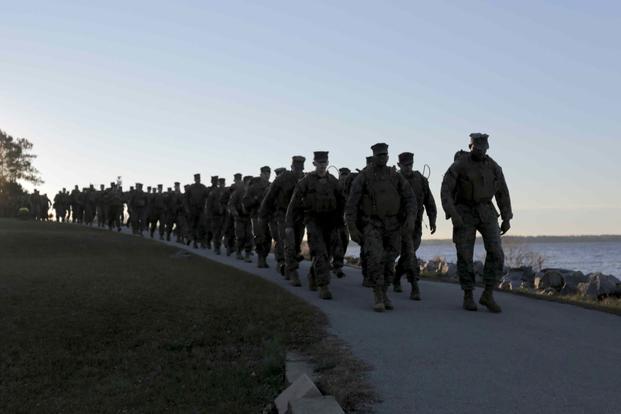As a next step in its gradual reopening strategy following a total travel shutdown due to COVID-19, the Pentagon on Thursday released a list of major bases for which travel restrictions have been lifted.
The announcement followed the Defense Department's move on Monday to lift its travel ban in six countries and all but three states, with the caveat that travel permissions remain subject to assessment of conditions at individual military installations. Currently, only California, Florida and Michigan remain under complete travel restrictions.
Read Next: Medals Approved for Troops Who Responded in COVID-19 Crisis
"Today's installation status update provides the status of travel restrictions for DoD Installations, facilities, and locations with greater than 1,000 DoD personnel assigned," Pentagon officials said Thursday in a statement. "Installations, facilities, and locations that have met the criteria set forth in the memo are indicated by 'yes' in the Travel Restrictions Lifted column."
Travel restrictions for bases were lifted, officials said, if the installations met the following criteria:
- Within the state, or relevant nation if not in the U.S., a 14-day declining trend in symptoms and cases, and no stay-at-home order in effect
- For the installation, a health protection condition status below the elevated state of Charlie, essential services available, quality assurance in place for military movers and no base-specific travel restrictions
- Approval from the relevant military secretary, combatant commander or the Pentagon's chief management officer to lift restrictions
"If installation conditions are subsequently not met, the approval authority decides if travel restrictions should be reinstated," officials said.
A six-page list of bases published by the Pentagon includes the travel restriction status of each. While all bases in California, Florida and Michigan and restricted countries remain closed to travel, some bases in otherwise greenlit states also remain closed.
Travel has also been greenlit for Bahrain, Belgium, Germany, Japan, the United Kingdom, South Korea, Puerto Rico and Guam, subject to the same conditions.
Major Army bases, including Fort Bragg, N.C.; Fort Benning, Georgia; Fort Hood, Texas; and Fort Drum, N.Y. all remain closed to military moves and travel, despite being in states where the travel ban has been lifted. In the Marine Corps, Camp Lejeune, N.C. is now open to travel, but Marine Corps Recruit Depot Parris Island, S.C., remains in the red.
Most Navy bases are still closed to travel, with some exceptions including Naval Air Station Corpus Christi, Texas, a pilot training base; and Naval Station Annapolis, Maryland, which houses the U.S. Naval Academy. On the other hand, many Air Force bases have been declared open to travel, including Joint Base Elmendorf-Richardson, Alaska, and Joint Base Andrews, Maryland, among others.
These travel limits are particularly consequential to troops and family members planning permanent change of station moves to new installations. Many were left in limbo in March when the Pentagon announced its sweeping travel ban, intended to halt the spread of the novel coronavirus.
While some military moves and other travel have continued, they have been required to qualify for specific exemptions, including operational needs, humanitarian reasons, or "extreme hardship."
The ban was originally set to expire May 11, but was later extended to June 30. The Pentagon announced the adoption of a conditions-based approach for states and installations June 29.
Travel between bases remains complex: only military moves between two "green" bases can currently take place without a waiver.
"If either the losing or gaining installation is 'red' or 'restricted,' the service member's travel would require to be either under the exemptions or waivers outlined in the [prior] Secretary of Defense memo," Pentagon officials said.
And the possibility remains for bases that have been greenlit to be placed back on the do-not-travel list. On Wednesday, Thomas McCaffery, assistant secretary of defense for health affairs, acknowledged a 41% spike in the military COVID-19 case rate in June, as states and regions begin a phased reopening process and relax restrictions.
Among service members, the case rate nearly doubled from 6,396 on June 1 to 12,521 one July 1, though the overall hospitalization rate has remained low. To date, three service members and five military dependents have died from the virus.
-- Hope Hodge Seck can be reached at hope.seck@military.com. Follow her on Twitter at @HopeSeck.












